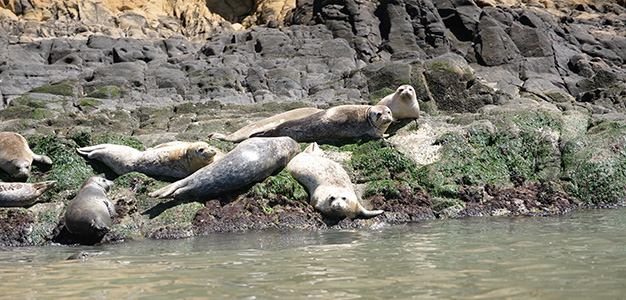This year, record numbers of starving seals and sea lions have washed up on California beaches, including those in the Bay Area.

Seals, birds and other wildlife are already feeling the effects of global climate change. Photo by Robb Most
By Sejal Choksi-Chugh
Published: November, 2015
This year, record numbers of starving seals and sea lions have washed up on California beaches, including those in the Bay Area. In recent months, hundreds of young common murres—sea birds that look like small penguins—have been discovered dead or dying on beaches in more than a dozen Bay Area locations. Scientists believe global climate change is negatively altering the supplies of fish eaten by birds and marine mammals.
In addition to the wildlife impacts we’re already seeing, global climate change will bring another serious consequence to San Francisco Bay: sea level rise. We only have estimates about how fast it will happen, but we know for certain that the result will be flooding along the shore. Wildlife habitat could vanish underwater. Wetlands, which help buffer the shoreline from flooding, but which also need some time during each 24 hour-period above water, could be permanently submerged.
Where the shoreline is developed, flooding could reach major infrastructure like sewage treatment plants, industrial facilities, and airports. This would lead to significant economic damage, and also send large amounts of toxic pollution into the Bay.
San Francisco Baykeeper is working to make San Francisco Bay and the Bay Area more resilient to sea level rise. One way we’re doing this is by challenging dredging methods that rob the Bay of sand. Routine dredging is necessary to keep ship channels open, but clean dredged mud and sand are being wasted—dumped far out in the ocean. The mud and sand could instead be used to build up and restore shorelines, creating natural flood defenses that protect communities and wetlands against rising water.
Another way we’re making San Francisco Bay more resilient to climate change is by reducing toxic pollution in the water. Healthy wildlife, free of toxins, will be better able to cope with disruption caused by climate change than wildlife stressed by polluted water and a contaminated food supply.
Baykeeper’s Clean Water Act lawsuits stop toxic pollution from some of the Bay’s worst polluters. Sewer agencies serving 20 Bay Area cities are now annually inspecting and upgrading their pipes and treatment plants to protect Bay waters from raw and undertreated sewage. Twenty-nine highly-polluting Bay Area industrial facilities are also now legally required to keep contaminated rainwater from running off their sites and into the Bay.
In addition, Baykeeper’s legal actions help stop trash and other pollution that washes off city streets and into the Bay. We’re working with the city of San Jose to protect the Bay from trash and fecal bacteria that washes off the city’s streets, parks, and open spaces into Bay tributaries. Our goal is zero trash pollution from San Jose by 2017. And then we’re going to work with other cities in a similar way.
As Baykeeper works to make San Francisco Bay more resilient to future climate change, we can all help the wildlife that’s being harmed now. If you find a sea bird in distress, wrap it in a soft towel or jacket and gently put it in a well-ventilated box. You can take it to a wildlife rescue center or contact your local animal control agency. If you find a stranded marine mammal, don’t approach it or touch it. Instead, call the Marine Mammal Center hotline at (415) 289-7325 with exact location information.
To learn more about Baykeeper and support our work, please visit www.baykeeper.org/donate.
Sejal Choksi-Chugh is the Executive Director of San Francisco Baykeeper. Baykeeper uses on-the-water patrols, science, advocacy and the courts to stop San Francisco Bay pollution. To report pollution, call Baykeeper’s hotline at 1-800-KEEP-BAY, e-mail hotline@baykeeper.org, or click “Report Pollution” at www.baykeeper.org.

